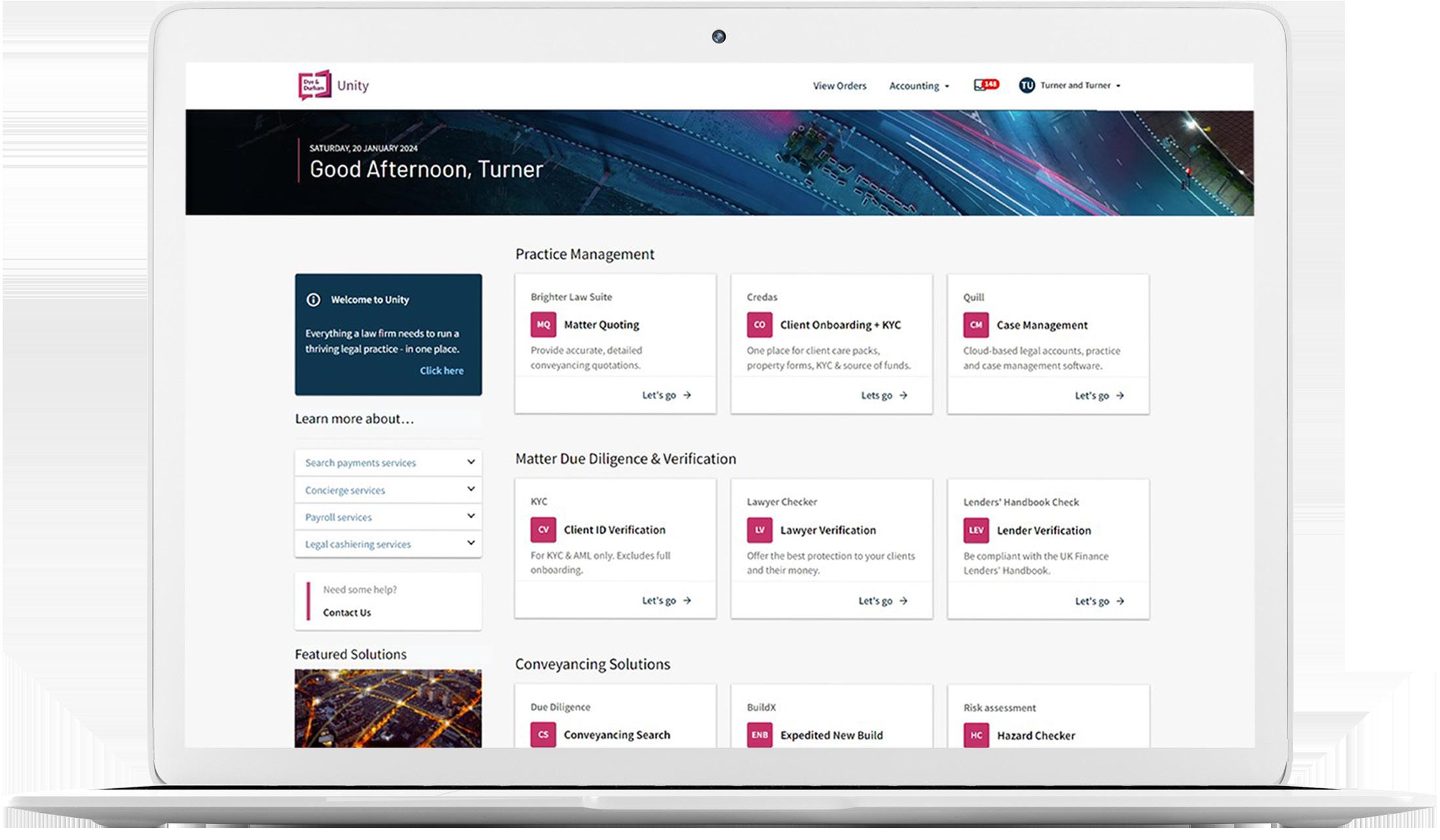






Committed to creating intelligent software customised to meet the needs of legal professionals, LEAP employs a dedicated team of specialist developers who present innovative AI solutions to automate routine tasks, simplify document management, and enhance decision-making, allowing lawyers to do what they do best - practise law.





www.birminghamlawsociety.co.uk
info@birminghamlawsociety.co.uk
Tel: 0121 227 8700
Birmingham Law Society, Suite 101, Cheltenham House 14-16 Temple Street, Birmingham, B2 5BG
Twitter: @bhamlawsociety Insta: @birminghamlawinsta
Editor: Jonathan Fraser. Editorial enquiries to jon@fu-media.co.uk
To advertise your business to Birmingham Law Society members call Fraser Urquhart Media on 0116 2533445 or you can email jon@fu-media.co.uk or kevin@fu-media.co.uk
4. President’s Address. 6. Upcoming and Past Events.
8. Meet The Birmingham Law Society Legal Award Winners.
10. Members’ News.
15. The Law Society’s Bicentenary: Celebrating 200 Years.
18. 4 Ways Technology Is Changing The Face Of Private Client Practice. 22. Data Security on The Governance Agenda?
Complaints Handling With The Legal Ombudsman & Legal Services Board.
30. Paralegal Experience As Stepping Stone To Becoming A Solicitor.





WITNESSES FOR: l Mechanical and Process Engineering l Manufacturing Industries l Oil and Gas Industries l Petrochemicals and Chemicals l Pharmaceuticals l Fertilizers and Pesticides
l Metallurgical Industries l Safety and Environmental



Welcome to the latest edition of the Birmingham Law Society Bulletin.
Many of us will reflect on spring and summer as a time of growth. With blooming flowers and lengthening days, spring and summer are seasons that invite us to embrace change and explore new horizons. In the legal profession, this time of year can also bring possibility. For law students, the end of the academic year can often lead to the first steps into legal practice. For established professionals, the start of new financial years and the onset of the holiday season can offer a chance to step back and set new goals.
This month marks 10 years since I completed my law degree at the University of Birmingham and began my journey in the professional world. The decade that has followed has been a whirlwind of new connections and experiences and I would never have imagined looking back that I would one day be where I am
now. But in and amongst this, there has been one consistent message – that as legal professionals, we must make and take opportunities.
During my presidential year, opportunity has been a fundamental theme. Within Birmingham Law Society, it is important that we create opportunities for those that are underrepresented and ensure that our profession continues to reflect the needs of the diverse society that we serve. It is also important that we create opportunities for our members to contribute to the work that we carry out, and take opportunities to advocate for the interests of our local profession on a wider stage.
As we head towards a General Election, sharing best practice and supporting each other could not be more important. The opportunities we face as a legal community are amplified during such pivotal times. In recent weeks, I have visited the Nottinghamshire, Leicestershire and Leeds Law Societies for their


annual dinners, where I have had the chance to strengthen our national relationships. We have also collaborated with the Royal Institute of Chartered Surveyors, the Institute of Chartered Accountants in England and Wales and the Chartered Institute of Building to hear from prospective mayoral candidates on the issues that are impacting our city.
However, in looking to the opportunities of the future, we must also remember those that will follow us. We must take time to empower others and create a cycle of opportunity that can continue for generations to come. By investing in the potential of our future leaders, we lay the groundwork for a more inclusive and dynamic legal profession. On 14 April, after 11 weeks of training, I completed the Manchester Marathon to raise money and awareness for my chosen President’s charity, the Social Mobility Foundation. I am proud that to date, we have raised over £2,000 which will support
the charity’s work in ensuring that talent from all backgrounds can be nurtured and rewarded.
On 23 April, the brand-new Birmingham Law Society Vacation Scheme gained its first cohort of graduates. At a fantastic event facilitated by Higgs LLP and Browne Jacobson, aspiring lawyers from a variety of backgrounds were able to participate in a mock assessment centre and gain experience of life in a law firm. On 30 April, we hosted an evening at Shoosmiths with the Future Faces Chamber of Commerce to enable junior legal professionals to build connections with their business counterparts.
On 23 May, we expanded the reach of our events outside of the city centre with a networking social at Higgs LLP’s offices in Brierley Hill, where it was fantastic to meet more of our members. On 25 May, we collaborated for the first time with the Solicitors Regulation Authority, Eversheds Sutherland and No5 Chambers to march in the Birmingham Pride parade, reinforcing the values of equality that are fundamental across every facet of the profession. I hope that these opportunities will be the first of many more to come.
Perhaps the most exciting event of the calendar will come on 7 June, when we will be welcoming almost 200 local, national and international guests for the President’s Dinner at the University of Birmingham Great Hall. As a graduate of the university, the Great Hall holds a special place in my heart, and I am looking forward to a fantastic celebration of our legal community which will combine tradition and innovation.
I am delighted that we will be joined by Jess Phillips MP, who has represented our region in Parliament for many years. Tickets are still available, and I would encourage everyone to secure their place at what promises to be an unforgettable evening. For those of you who are looking even further ahead to the depths of summer, please do look out for details of our Sports Day and Summer Social – I look forward to seeing many of you there.
As we navigate the coming weeks and months, I hope that we can all take some inspiration from the theme of opportunity. Let us use this time to reflect on how far we have come, to embrace new prospects, and to champion the continued growth and development of our profession and our city.





I have been attending Birmingham Pride for the last 20 years and I can honestly say that this year’s celebration was one of the best writes Marc Forrest -Thomas.
This year I walked proudly with my colleagues from No5 Barristers’ Chambers, alongside the Birmingham Law Society group and the LGBTQ+ subcommittee, of which I am vice chair.
I’ve been working within the Birmingham legal sector for a good portion of those 20 years and the inclusive space that we are now in is unrecognisable from when I first started my journey. I’m fortunate enough to work at one of the largest sets of Chambers in the country but also one that not only embraces but champions equality, diversity and inclusion. This is the first time that we’ve had our own walking slot at Birmingham Pride but we have been proudly collaborating with Birmingham Law Society for a number of years.
This year the Birmingham Law Society partnered with the Solicitors Regulation Authority and Eversheds Sutherland for the first time and we all came together for a prepride brunch, hosted by Eversheds in their lovely restaurant and garden. It was fantastic to see a combination of barristers, solicitors and staff from all of these organisations coming together as one, for such a great cause.

The theme of this year’s Pride was ‘Love Has No Limits’ and I certainly felt this throughout the parade, which was the biggest to date with more than 8000 people taking part. We’ve come such a long way as a profession but there is still work to be done so that every strand of the community is treated fairly and encouraged to live their authentic lives, both professionally and personally.
This was the first Birmingham Pride since the formation of the BLS LGBTQ+ sub committee. It was brilliant to meet so many new people and talk about the work that we’re doing and the plans that we have coming up.
Please feel free to contact either myself or our Chair, Shereen Johal via LinkedIn if you’d like to keep up to date with all things BLS LGBTQ+.
President’s Dinner 2024 sponsored by Access Managed Services, Landmark Information, LEAP, Lloyds Banking, University of Birmingham Law School and The College of Legal Practice 7th June, 6.30pm – 12am, University of Birmingham Great Hall. £120 +VAT for member ticket | £140 +VAT for non-member ticket
Social Mobility Conference sponsored by Squire Patton Boggs 13th June, 8.30am –12.30pm, Squire Patton Boggs. FREE for all to attend
Networking Social for Lawyers sponsored by St Philips Chambers 19th June, 6pm – 8pm, St Philips Chambers. FREE for members | £10 +VAT for non-members
Lunch Club with Gosia Federowicz, CoFounder, Wellbeing in Your Office 25th June, 12pm – 2pm, Revolución de Cuba. £25 +VAT for members | £30 +VAT for nonmembers
An Evening with EAT Judges Eady and Choudhury sponsored by 3PB Barristers 26th June, 5.30pm – 8.30pm, 3PB Barristers. FREE for all to attend
SQE Roundtable with The College of Legal Practice: Making Qualifying Work Experience work for your organisation 27th June, 12pm - 1.30pm, Greens Solicitors. FREE for all to attend
BLS Sports Day sponsored by BCL Legal and Mazars 3rd July, 4.30pm – 8pm, Harborne Cricket Club. £30 +VAT for individual member | £35 +VAT for individual nonmember £240 +VAT for member team of 8 | £280 +VAT for non-member team of 8
Talking Crime 2024: A Criminal Law Committee Panel Discussion sponsored by No5 Barristers’ Chambers 4th July, 4pm –6.30pm, No5 Barristers’ Chambers. FREE for members | £10 +VAT for non-members
Planning and investing for your lifetime: The foundations of financial planning in partnership with Quilter Cheviot 9th July, 1pm – 2pm, Irwin Mitchell. FREE for members only
Planning and investing for your lifetime: Building your financial future in partnership with Quilter Cheviot 10th July, 1pm – 2pm, Irwin Mitchell. FREE for members only
Planning and investing for your lifetime:
Mastering wealth preservation in partnership with Quilter Cheviot 11th July, 1pm – 2pm, Irwin Mitchell. FREE for members only
Cricket Tournament 2024 11th July, 9am – 8.30pm, Moseley Cricket Club. £550 +VAT for member team of 6 | £600 +VAT for non-member team of 6







Summer Networking Social sponsored by LEAP 25th July, 6pm – 8pm, The Button Factory. £25 +VAT for members | £35 +VAT for non-members
To reserve your place and find out more, make sure that you visit www.birminghamlawsociety.co.uk



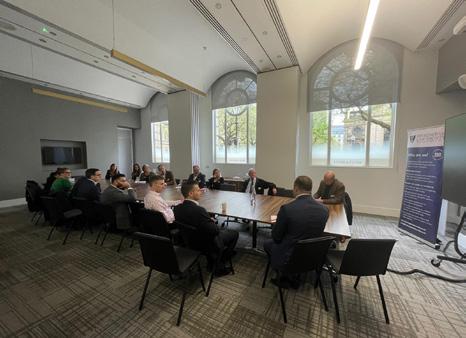



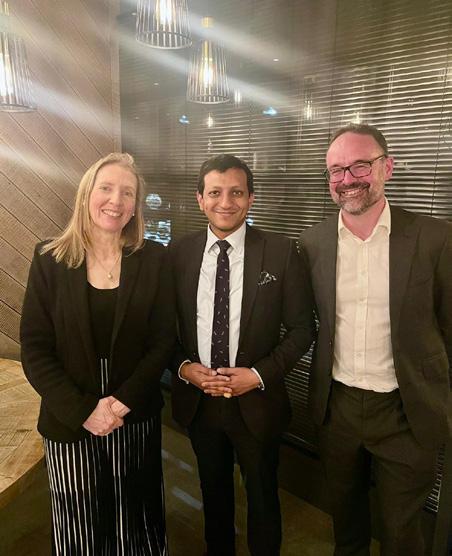

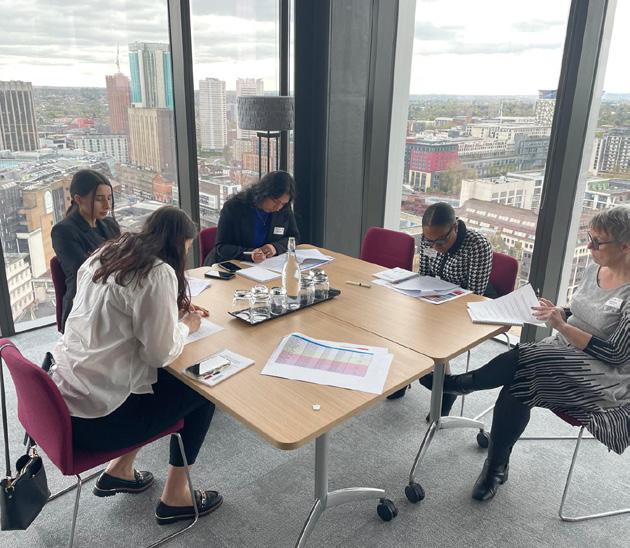

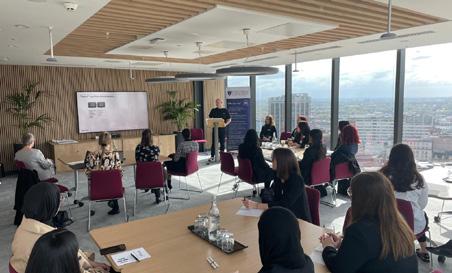
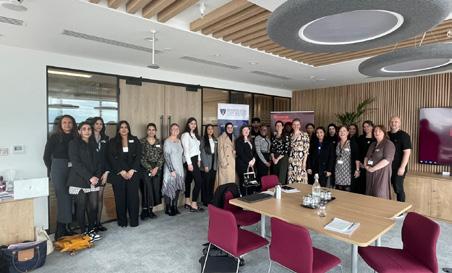
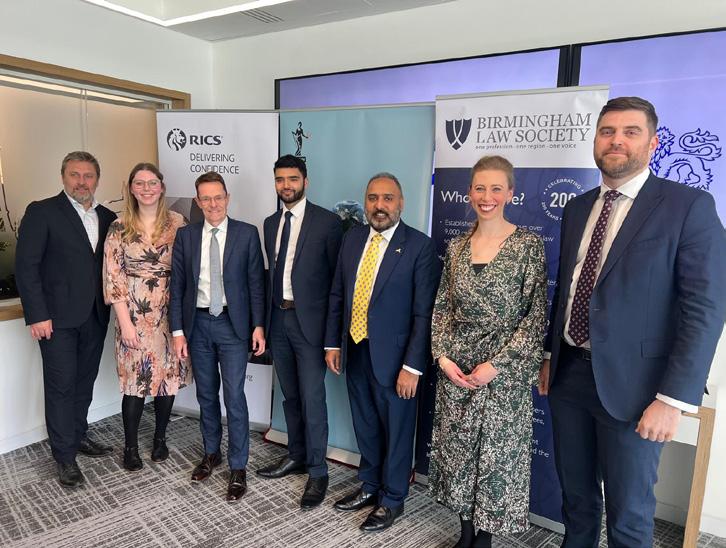




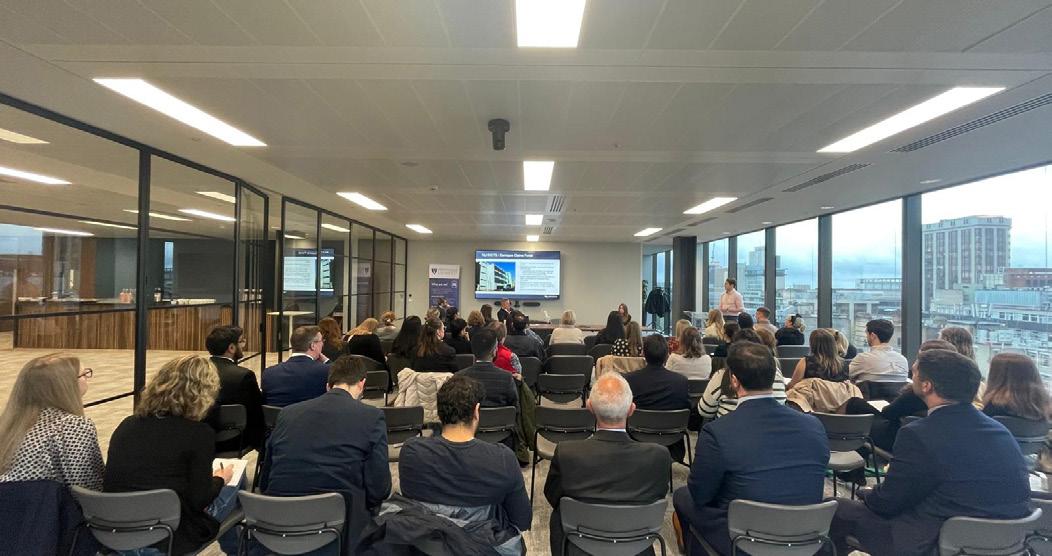





How have you celebrated your win? I didn’t get much time to celebrate immediately after my win as I had my final bar exams. However, now they have finished I celebrated with Birmingham Law Society at the awards dinner, which was amazing, and then I went for a pint down my local pub.
Is there anyone that you would like to thank who has been instrumental in your success? My parents and my sister have been instrumental in the successes I have achieved, they have al-ways provided me with all the love and support I could need. I would not be where I am today without the unwavering support and affection from my Fiancé Connor who has been there for me, spurring me on in the most trying of times.
If you had to make an elevator/twitter pitch about your day to day role what would it be? As a Bar student, I have no ‘day-to-day’ role as such. However, it is my responsibility to hone my advocacy and drafting skills to best represent future clients. Aside from my studies, I volunteer as a Brownie Leader at my local Girl Guiding group this role involves coordination of group activities and safeguarding the children.
If you could create one new law what would it be? If I could create one law it would be free school meals for all children, I have seen firsthand the need for free school meals in schools. I believe every child should go to school knowing they will be able to eat.
What one thing do you think lawyers need to do to be better? I think creating accessibility to the legal profession is extremely important and I believe improving accessibility can be helped by lawyers within the profession; giving talks at schools to children whom would otherwise think the law is inaccessible to them. The legal profession should be acces-sible to all and it’s our responsibility to do this.
How have you celebrated your win? We were delighted to have won Regional Law Firm 2024, Gareth O’Hara, Senior Partner, Corporate sent out video message to all Wilkes staff thanking them personally, along with the video message, cakes (a Wilkes favourite) were distributed to all three of our offices.
Is there anyone that you would like to thank who has been instrumental in your success? This incredible achievement is a testament to the hard work and dedication of our amazing Wilkes team. We are incredibly proud of this recognition and grateful for the opportunity to showcase the firm. A special thank you too our Sustainability committee, our Diversity & Inclusion committee and our CSR committee members.
If you had to make an elevator/twitter pitch about your day to day role what would it be? As Managing Partner at Wilkes, my days are varied. From overseeing the strategic direction of the business to personally handling complex legal matters, no two days are the same. But my genuine enjoyment comes from working di-rectly with clients from estate planning to property transactions, understanding their needs, providing expert guidance and seeing clients achieve their desired outcomes.
If you could create one new law what would it be? To overhaul the legislation surrounding the Residential Nil Rate Band (RNRB). Our aim would be to simplify the position by removing the RNRB and increasing the nil rate band to £500,000 for all indi-viduals upon death.
What one thing do you think lawyers need to do to be better? Speaking to each other and our clients face2face or by phone, instead of emails. It can be hard with time restraints, and it is often thought it is easier to email. However, speaking directly face2face or over the phone can really help to build trust, relationships and lead to better understanding and more effective problem solving.

How have you celebrated your win? My priority was eating a tub of Ben and Jerry’s. I had a virtual celebration with my brother, and then enjoyed a classy dinner with my parents.
Is there anyone that you would like to thank who has been instrumental in your success? I am grateful to many who support me and continue to help me develop, but a special thanks must be given to my grandmother. She was a haven of encouragement, wisdom, and joy (and never failed to make sure my belly was full).

have you celebrated your win?
Is there anyone that you would like to thank who has been instrumental in your success? My lovely, lovely clerking Team (Oli, Jay, Georgia and Harie). And my instructing solicitors. Getting instructed in a new case is always a bit exciting (even now) as I really enjoy working with a team of other lawyers trying to unpick the problems that litigation throws at you.
If you had to make an elevator/twitter pitch about your day to day role what would it be? Being a trainee is all about being outside your comfort zone. You are responsible for juggling many hats, and no day is the same. Often, you find yourself having to climb a steep learning curve but you adjust to the pace of the role and start to become comfortable in discomfort. A transition eve-ry 6 months enables you to learn about different areas of law with the guidance of a supervising solicitor, and you start to use words that you did not realise you knew, like loquacious, to describe yourself. Being a trainee is about growth. It is a challenging but enjoyable experience.
If you could create one new law what would it be?
Access to justice is a basic human right for all however there are numerous barriers that delimits accessibility to the law, including the cost of legal services, the lack of funding for legal services, and the complex nature of the law. There should be no qualifying requirements for an individual to have a fundamental human right. Everyone should have access to the law.
What one thing do you think lawyers need to do to be better? I was considering this during Mental Health Awareness Week, and I thought about the thrill of the job but also the pressures that come with it. We are often informed that lawyers need to be resili-ent (which often rings true) but lawyers are people. Each lawyer has a responsibility to support one another during the times when we are not feeling as resilient as usual.
If you had to make an elevator/twitter pitch about your day to day role what would it be? She rushed along the corridor with her gown billowing behind her, holding her wig on her head as she ran. Would she get to the courtroom in time? She slowed to a hasty walk, took her seat and addressed the judge. “If it pleases Your Honour, I’d like to submit that the respondent has missed a vital piece of evidence in this case …”
Err. No. About 50% of my time involves being in court, usually a tribunal because I specialise in employment law and discrimination. But no wigs, no gowns. CVP hearings are good – I can wear slippers – but it’s also nice to go to live hearings. If I’m lucky, it will be a professional opponent instead of a litigant in person on the other side!
After that I’ll usually tackle some paperwork: this week I have an opinion on a tricky question, amending (again) a complex list of issues, and preparing some skeleton submissions. I also do investigations, so I might be interviewing witnesses or report writing.
Evenings often mean committee meetings – perhaps for one of the charities I work with, or for the Bar Council or Midland Circuit. Afterwards, a walk is a good way to decompress!
If you could create one new law what would it be? An overhaul of equal pay legislation and procedure
What one thing do you think lawyers need to do to be better? Spend more time away from work/with their families, and put the law and legal problems that they face every day into perspective.

Award-winning law firm Bexley Beaumont has expanded its Midlands operations with the recruitment of Corporate law specialist Phil Miles as Legal Director.
He became the fifth member of Bexley Beamont’s Corporate team in Birmingham and the 12th fee earner across all legal disciplines which it has appointed in the ‘heart of England’ region.
Chief Executive Karen Bexley said that the recognition had enhanced Bexley Beaumont’s already growing reputation as “the boutique law firm of choice for top talent” in the Midlands and across the rest of the country.
“Phil joining us is more than just another indication of the growing strength of our team in the Midlands and our desire to provide clients with the best possible service. In addition to
being incredibly capable and very experienced, he shows how our emphasis on attracting high calibre lawyers who fit with our vibrant and distinctive team culture is really paying off.”
Having qualified at DLA Piper, Mr Miles has since been involved in a large volume of corporate transactions, including sales, acquisitions and company restructuring, during spells with a number of familiar legal brands. In all, Bexley Beaumont now has 54 Partners and five Associate Solicitors despite only opening its doors in 2020.
Phil’s arrival coincided with the firm’s being named as Law Firm of the Year at the Modern Law Awards. That triumph was swiftly followed by its securing a place on the shortlist in the Law Company of the Year category of The Lawyer magazine’s annual Awards. Shortlisted firms will discover if they have been successful at a prizegiving ceremony which will be held at London’s Grosvenor House Hotel on Tuesday, June the 18th.

Squire Patton Boggs has announced the appointment of partner Ellie Pinnells, who joins the firm from Fieldfisher to lead its Birmingham Litigation team.
Ms. Pinnells is an experienced commercial litigator, used to leading
cross-border teams on high value and complex international cases. She has particular specialisms in group litigation and competition litigation, and has been recognised as a Hot 100 lawyer for her expertise and focus on developing innovative technology.
Born of English parents, Ms. Pinnells was brought up and educated in Mainz, Germany. She is bilingual and led the German desk at her previous firm. Her client base is in the manufacturing, engineering and construction sectors, and includes many companies domiciled or operating in Germany.
“Ellie is a talented, highly capable lawyer with a track record of handling complex disputes,” said UK head of Litigation, Stephen Sampson. “Ellie’s skills and experience complement our
business and strategy and her arrival forms part of our ongoing investment in growing our nationwide team, with several recent partner additions in London and Manchester.”
Tom Durrant, managing partner in Birmingham, said “Ellie joins us at a time when demand for our litigation services is high and we’ve also seen new opportunities to win disputes work coming out of the expansion of our Corporate practice in Birmingham, so she will be a very welcome addition to our team.”
On joining the firm, Ms. Pinnells commented: “I am excited to join Squire Patton Boggs. “It’s globally recognized disputes team, strong Birmingham presence and commitment to DEI, as evidenced by the firm’s diverse leadership team, made Squire Patton Boggs the right home for me and my practice.”


The joys of the new Intermediate Track were discussed on 14 May 2024 at the BLS PI/ CN Seminar, hosted at the new office for No5 Chambers together with Irwin Mitchell Solicitors writes Alexander Mellis, BLS Personal Injury and Clinical Negligence Committee
The morning seminar was in two portions; a talk from Steve Fisher of No5 providing an overview of the Intermediate Track, the new rules and the new nomenclature that everyone will need to get to grips with. He was followed by Alex Davenport from Irwin Mitchell, who spoke on the relationship between the Intermediate Track and the court digitisation programmes; IT and IT one could say.
Personal injury practitioners arguably have a slight advantage in that our involvement with the new track only applies to cases
arising from accidents on or after 1 October 2023. For disease cases it is letters of claim sent on or after that date. It will be a little longer before these cases start to get issued and work their way through the courts. Clinical negligence practitioners may find themselves in the unenviable position of only very occasionally being required to engage with the rules, given the limited application of the new track to those cases. Keeping on top of the changes is probably all the more important for it.
Important aspects covered off in Steve Fisher’s talk included:
• the types of cases that would fall within the new track, the exceptions and the usual overarching discretion to nonetheless allocate to the IT ‘in the interests of justice’;
• the introduction of assignment to complexity bands within the Intermediate Track, (also a feature of the changes to the Fast Track costs). There are 4 bands, which roughly relate to the more complex the case, the higher the
band and the higher the costs that can be recovered;
• the introduction of new costs stages over the course of the case through to trial;
• Some potential issues or holes that may yet need some assistance from the courts or Rules Committee.
Turning to the other ‘IT’ aspect of the talk, Alex Davenport reminded everyone of the benefits and burdens of the courts’ digitisation process. It is, however, a process that is only going to accelerate.
The main takeaway is no doubt that about the time that personal injury practitioners start to issue Intermediate Track cases and see them progress through the court system, increasing amounts of that process are likely to be managed ‘online’, such as within the Damages Claims Portal, beyond the stage for DQs where such cases presently fall out of such regimes.
Getting ahead of these changes and understanding how they work will not only be vital to stop practitioners getting caught out, but in the long run may lead to ever important efficiency savings, vital in an increasingly fixed costs world.
The BLS PI/CN Committee were happy to see so many of you there on 14 May 2024 and look forward to putting on future events. If you do have any feedback about what you want to see put on in the future, please do let us know.
The Committee is still recruiting so if you want to get involved do not hesitate to get in touch and get involved.

National law firm TLT has appointed five new legal directors as the firm continues its growth in Birmingham. The new appointments will broaden the firm’s offering across financial services disputes and investigations, corporate, commercial and commercial dispute resolution practices.
The firm has grown its litigation practice with the appointment of three expert litigators including Rebekah Finch who has joined TLT’s national commercial dispute resolution team to advise a wide range of corporate and commercial clients in relation to various commercial disputes. Alongside Rebekah, Amanda Wootton and Julie Peel have joined TLT’s financial services disputes and investigations team,

providing expert legal advice to a wide variety of financial institutions, and advising on some of the most complex disputes in the financial services sector.
TLT has also strengthened its corporate offering with the appointment of Leanne Fryer who specialises in M&A for large corporates, SMEs and owner managers. At TLT, Leanne will focus on MBOs, private equity investments and equity release arrangements.
In addition, the firm has appointed public procurement and public sector contracts expert Claire Gamage to its commercial team. Claire has over a decade of experience supporting both public bodies and private businesses

on high-profile procurements, predominantly in the IT, healthcare, defence, real estate and infrastructure sectors, and will play a central part in expanding TLT’s commercial offering.
The news builds on the recent opening of TLT’s office in Birmingham – the firm’s seventh across the UK.
Mark Elder, partner and head of location in Birmingham commented: “Rebekah, Claire, Amanda, Julie and Leanne are extremely talented lawyers in their respective fields, and they will significantly enhance the service we’re offering clients across four of our core practice areas. We’re delighted to welcome them to the team.”

Thursday 12th September
7pm - 1am | Aston Villa Football Club
£65 +VAT members | £75 +VAT non-members




Aimed at everyone but in particular, junior lawyers who have not always had an opportunity to attend the BLS dinners. Bringing together 100+ guests at Aston Villa FC, this is your chance to celebrate your achievements and mingle with fellow professionals.
Click here for more details and to book your tickets.
Birmingham Law Society (BLS) is proud to launch its 2024 Diversity and Inclusion Scheme (DIS).
BLS first launched its DIS in 2020 in order to support talented young people from disadvantaged backgrounds and underrepresented backgrounds to pursue a career in law. The DIS seeks to address barriers to individuals accessing a career in law and help improve social mobility and diversity in the legal profession by supporting people who face obstacles in pursuing their ambitions in the legal sector.
This year, as we embark on the fifth year of the scheme, BLS is pleased to be partnering with The University of Law, The College of Legal Practice, Higgs LLP and Gateley Legal.
The DIS 2024 seeks to provide successful candidates with financial support in pursuing their Legal Practice Course (LPC) or the Solicitors Qualifying Exam (SQE) studies as well as offering real work experience opportunities via vacation scheme placements and meaningful mentoring with our partner firms.
Alice Kinder, Birmingham Law Society President and Chair of the Birmingham Law Society Social Mobility sub-committee said: “I am very proud that Birmingham Law Society is running this scheme for a fifth consecutive year. An individual’s background can have a huge impact on their ability to access and progress in the legal profession. Social mobility has been a key focus during my Presidential Year and it is very important that the Birmingham legal community
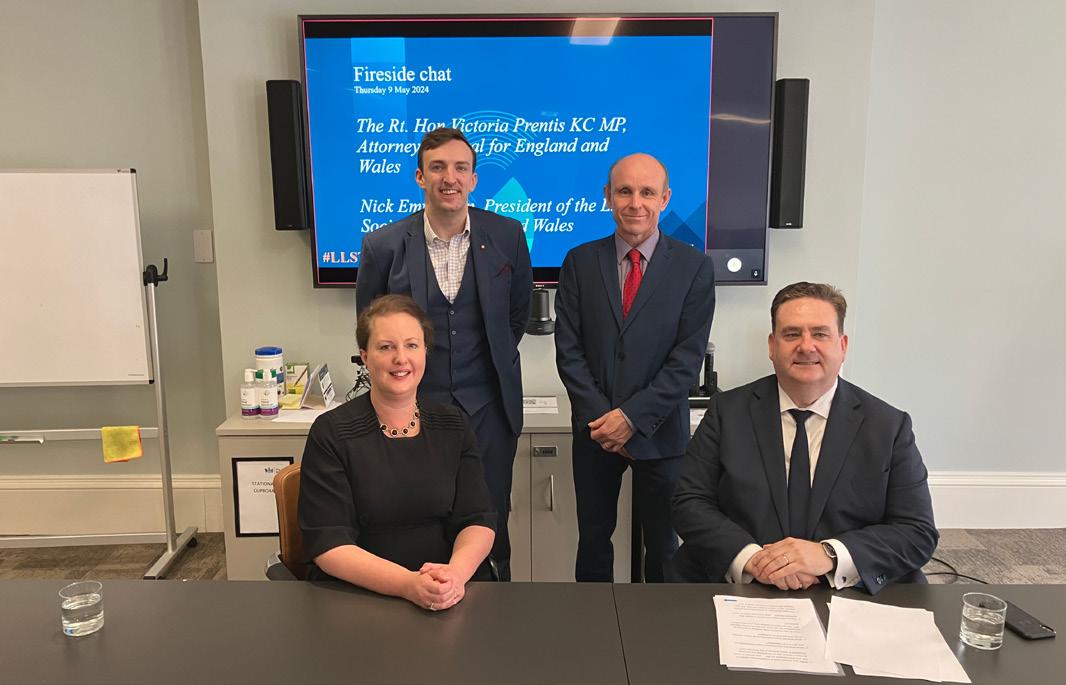
On the 9th May our Chief Executive Nigel Hollett and Vice-President Richard Port MBE travelled to London for an all-day meeting at The Law Society which involved many of the other local and regional Law Societies from England and Wales and several other stakeholders.
The Law Society is keen to enhance its engagement with its wider membership by encouraging constructive dialogue with members to better understand their needs and what support they need so that collectively we can drive forward the legal profession as a whole.
The Law Society’s corporate objectives include a focus on their membership offer, lobbying and influence, enhancing internal management, and fostering a supportive workplace for staff. They aim to provide members with valuable resources and professional development opportunities.
works together to break down these barriers. I would like to thank the Social Mobility Sub-Committee and our partner organisations for their support in providing this fantastic opportunity.”
Applications open on 3rd June 2024 and close on 15th July 2024.

For information, visit our website here.


As the Society looks ahead to its 200-year anniversary, it plans to highlight its rich history through storytelling and inviting members to actively participate in these commemorative activities. By doing so, The Law Society intends to create a sense of shared heritage and collective pride among its members which Birmingham will play a key part in.
During the fireside chat with the Attorney General, informal questions were posed about her role and background. Nigel enquired about the government’s efforts to devolve jobs across the UK, particularly to the Birmingham area, and how engagement with the new West Midlands Combined Authority Mayor will take place to support the legal sector.
This presents an opportunity for BLS to gain traction with policymakers and highlight the important contribution our members make to the regional and national economy. The Attorney General expressed strong commitment as a lawyer to supporting the legal profession.
With large number of MPs intending to stand down at the next General Election this will bring significant changes to parliament. BLS is working closely with TLS in relation to better understanding what a change of government will mean for our members and we will update you in due course.

In 2025 the Law Society of England and Wales will celebrate its 200th anniversary. This is a huge milestone in our history and an exciting moment to be part of writes Amy Murat, Bicentennial Programme Manager.
Our bicentenary will be about feeling proud of the Law Society and the legal profession and celebrating our diverse community. We want to engage with members more than ever before and we want to demonstrate the impact of the profession on a public platform. Our 200 years will also be a moment to reflect – on where we are now, on how far the profession has come, and where it is headed.
To celebrate this, we are planning a year-long programme of activities and events, showcasing the past, present and future of the Law Society and the legal profession. The programme has been in the making for the past year and has been developed in tandem with our members, including local law societies and Council members. The bicentenary programme’s guiding thematic principles have been identified with members through the practicing certificate fee member consultation last year.
What the year will look like?
The bicentenary celebrations will
start in October 2024, in line with the opening of the new legal year, and run throughout 2025.
The bicentennial programme itself will draw together existing work across the organisation and create new initiatives specifically for the bicentennial year. These include activities such as:
• A digital exhibition showcasing the history of the profession.
• An enhanced Presidential roadshow with special events across England and Wales focusing on local stories championing solicitors and the profession. We will base this tour on a ‘history road map’, highlighting important stories from the past and present.
• Admissions ceremonies with a unique 200-year focus and feel.
• International receptions and webinars engaging the significant member community working outside England and Wales.
• A Gazette special feature
• Creation of an expert art advisory group to help us diversify our current portrait collection and plan how it can better reflect and engage the modern profession.
• Launch of the Reframing Justice
report (read about the project and our Year 1 findings) alongside the culmination of our work on ethics and 21st Century Justice.
Alongside our confirmed events, we would also like to open 113 Chancery Lane to the public as part of the much-loved Open House Festival weekend and showcase our heritage and beautiful historic building.
How you can support
We are keen to engage with our members across England and Wales to seek ideas and input for stories we might tell in a history of the profession. For this, we would like to understand the experience of regional law societies, particularly their experiences of celebrating similar milestones, and how they may wish to support the bicentenary programme.
We would be grateful to receive any ideas, be they significant solicitor stories from your region or milestones past and present. All ideas will feed into the research we are undertaking into historic and contemporary stories for the creation of our digital history and history road map.
If you are interested in finding out more, or would like to share information or a story of the profession in your area please contact amy. murat@lawsociety.org.uk

The legal landscape is undergoing a profound transformation, driven by various factors including technological advancements, cultural shifts, and recent impactful events such as the COVID-19 pandemic and high-profile legal cases like the Post Office and RICS scandals. In light of these changes, it’s crucial to anticipate how the role of in-house lawyers will evolve by 2025. Drawing from insights gleaned from working closely with nearly 200 in-house legal professionals across various teams, coupled with recent predictions from KPMG, here are five bold predictions for the future of the in-house legal role writes Donna McGrath.
1. Legal Will Need to Lead:
Recent scandals, such as the Post Office debacle, underscore the imperative for legal teams to proactively navigate evolving landscapes. The fallout from errors within the Post Office’s Horizon IT system highlights the repercussions of legal systems lagging behind technological advancements. In response, legal professionals must adopt a leadership role, actively shaping change rather than merely reacting to it. By anticipating and mitigating risks, especially those posed by emerging technologies, legal teams can prevent future crises and uphold organisational integrity.
2. Move From Defenders to DriversData Gatherers:
In-house legal teams are transitioning from defensive positions to proactive contributors to financial results. This shift is marked by the adoption of key performance indicators (KPIs) that measure contributions to revenue generation and customer experiences, alongside traditional metrics like cost and risk mitigation. Technological advancements facilitate this transition by streamlining data collection and analysis, enabling legal professionals to provide realtime insights into legal effectiveness and its impact on business outcomes.
3. Legal Chief Operations Offices will be as Important as the General Counsel Role:
The transformation of legal functions necessitates the elevation of Legal Chief Operations Officers to roles of equal importance alongside General Counsels. With legal functions becoming genuine partners to the business, these officers will focus on refining operating models, ensuring efficient functioning, and driving continuous improvement.
4. Learn Skills to Transform Culture: To effect meaningful change in legal operating models, fostering a
culture of continuous improvement and innovation is essential. This requires not only upskilling legal teams but also securing buy-in from organisational leadership and implementing robust change management strategies. By embracing these initiatives, organisations can navigate the complexities of the evolving legal landscape successfully.
5. Need to be Tech Savvy and SelfServing Clients:
Standardised legal duties will integrate into business frameworks, with routine responsibilities automated and equipped for self-service. Legal teams must ensure that self-service options are user-friendly and provide highquality experiences for internal stakeholders. This shift will enable leaner legal teams to focus on strategic endeavours while enhancing risk management and efficiency.
In addressing these predictions, in-house legal teams face significant challenges, including understanding their evolving roles, transforming organisational mindsets, and overcoming time and resource constraints. To surmount these challenges, the In-House Lawyers Leadership Programme (ILLP) provides a comprehensive framework for navigating the changing landscape, equipping teams with the tools and strategies necessary for success.
The future of the legal profession is one where in-house legal teams lead organisational change, driving success through innovation, data-driven insights, and strategic guidance.
To embark on this transformative journey, organisations can book a discovery call with Donna McGrath here, sign up for the newsletter here or download the podcast here
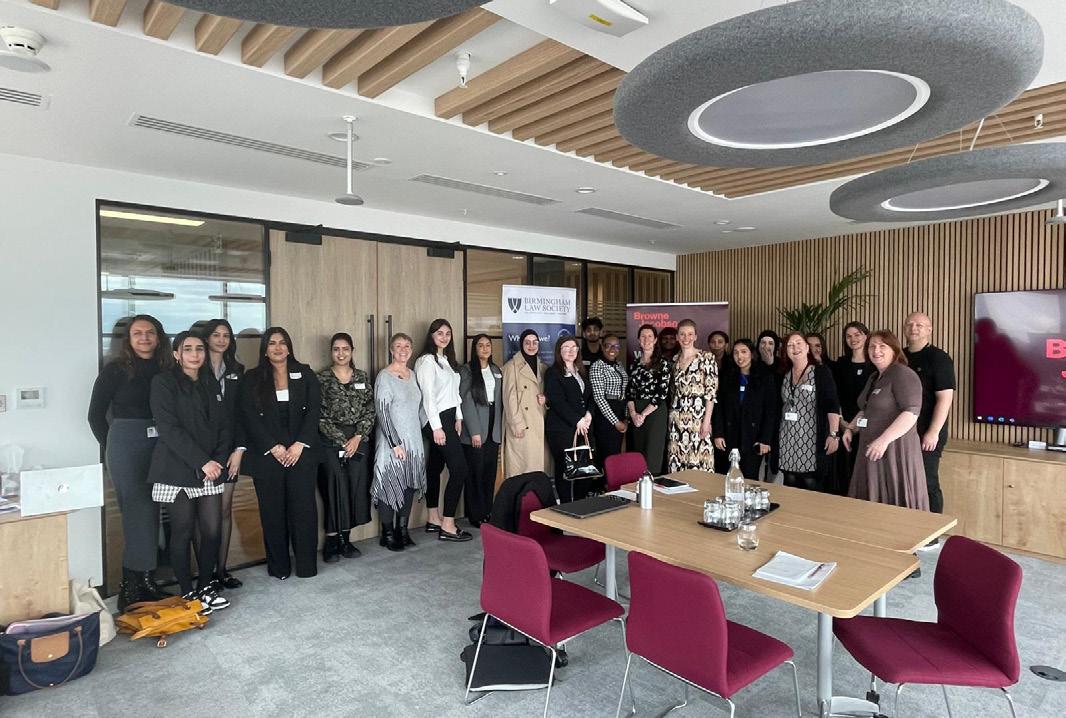
Participating in the Birmingham Law Society Vacation Scheme has been a transformative experience. Each session, meticulously designed and delivered by outstanding professionals, has not only developed valuable skills and provided insights into the legal profession, but also introduced me to a network of likeminded individuals writes By Imogen Holland, Keele University student.
The December session led by Rebecca Mander delivered an incredible session on confidence, assertiveness, and resilience. These fundamental yet often overlooked qualities were brought to life through practical tools like the Positive Activity Log. By celebrating daily victories, it is possible to adopt a resilient mindset.
In January, Peter Hill’s session covered effective communication, advertising, pitching, and networking skills, which academia does not usually cover. Yet these skills are undeniably essential for future success, from articulating why you are the best candidate for a role to communicating answers to problem questions in interviews. Moreover, the ability to network and develop such skills has enabled me to connect with fantastic members of the Birmingham Law Society.
February delved into the ins and outs of the Solicitors Qualifying Examination, courtesy of Chrissie Wolfe, who
demystified what constitutes qualifying work experience and the importance of building relationships with employers in such settings. In a competitive job market, such insights are gold dust for aspiring solicitors.
The last session in March was an immersive experience by Browne Jacobson, offering a practical simulation of what solicitors do. From drafting a settlement agreement to advising on disputes, each task served as an invaluable understanding into the demands of the legal profession. By offering hands-on experience in developing legal drafting skills, the simulation enabled participants to engage in activities they may otherwise not get to try.
The final aspect of the vacation scheme was the inperson event hosted in collaboration between Higgs LLP, Browne Jacobson and Birmingham Law Society. This event offered important information and advice on assessment centres and how to approach the application process as well as the opportunity to engage in assessment centre activities. A highlight of this was that we were able to ask questions and receive brilliant feedback on these activities. Towards the end of the event, we were able to listen to Anna Manning give an exceptional talk on normalising rejection and building resilience - something which is thankfully being discussed more openly.
Overall, the Birmingham Law Society vacation scheme has been an exceptional experience that cannot be underestimated with what it has had to offer for its participants. This initiative, spearheaded by Alice Kinder, is a step forward in providing opportunities to those who do not have connections in the profession, enabling them to obtain meaningful legal experience and develop the required skills to succeed in the future. I am grateful to have had the opportunity to participate, and I would highly recommend to others aspiring to join the legal profession!
For those interested in following me on my legal journey, please feel free to connect on LinkedIn! https://www.linkedin.com/in/imogenholland/

Ian Fellows, Senior Lecturer in Enterprise and Employability at Birmingham Newman University
has been awarded Fellowship of Enterprise Educators UK (EEUK).
EEUK Enables excellence in enterprise and entrepreneurship education, connecting and supporting
enterprise and entrepreneurship educators across the world. EEUK inspires its members to innovate whilst increasing the scale, scope, and effectiveness of their practice and research to influence positive change in UK and International Policy.
Ian Fellows said: “I am delighted and honoured to receive this recognition for the work I’ve done with the student and graduate entrepreneurs of Birmingham Newman University.
In an environment where enterprise skills are increasingly sought after, seeing the learning, development, and growth of our entrepreneurs has been one of the most satisfying parts of my role.”
Ian has spent twenty-five years in leadership positions in public, private, and third sector organisations in before working in higher education. Ian leads on work-related learning programmes and the Masters in work-based learning.


While traditionally perceived by many as slow and antiquated, private client practice is, in reality, an area of law that is required to move quickly, with an increasing number of practitioners being asked to serve a broadening section of society and their evolving needs. Society and the world we live in are changing at a rapid pace, and so must the technology practitioners use and the service they deliver, in order to stay relevant writes Craig Matthews, CEO of LEAP Estates
Legal Technology is revolutionising the delivery of estate planning, probate, lifetime planning and will preparation services by:
Centralising digital matter files in the cloud
Providing a single, secure, and searchable electronic matter is central to streamlining private client practice. It offers one fully searchable digital file containing all data, documents, and emails related to that matter, easily accessible within the cloud. Granting practitioners the ability to access up-to-date matter information and documentation from any location streamlines client service, enhances collaboration, and minimises duplication of work, errors, or inaccuracies.
An additional benefit of having a single digital matter file with up-todate client and matter information is the ability to generate and complete documents with ease, by merging the captured details into letter templates and court and government forms quickly and consistently.
Leading legal software providers are offering intuitive technology that simplifies the day-to-day life of a private client practitioner. They are developing innovative productivity tools to complete time-consuming tasks, such as estate account and inheritance tax automation. Technology streamlines the collection of estate data and the generation of IHT forms, applying up-to-date legal rates and calculations in line with updates to legislation and cost changes.
Enabling wills and LPAs to be drafted in minutes
Critical to the profession in terms of technology is highly automated specialist will writing software. Such software includes up-to-date clauses maintained by experts, enabling practitioners to create both simple and complex wills, as well as lasting powers of attorney, with ease. The fast and accurate production of wills and LPAs is pivotal to a successful private client
practice, improving client service and saving valuable practitioner time.
Allowing powerful system integrations
We all know that practice management software is pivotal to the success of a private client practice, but how the software integrates with other technology to add value to private client practitioners is something to consider. Tools to further streamline processes might include verification of identity and funds, document collaboration, time recording, online payment and eSignatures.
As practitioners face growing and diverse clientele with everchanging needs, adaptation is crucial. This dynamic shifts in society necessitates innovative technology in order to remain relevant, revolutionising estate planning, probate, lifetime planning, and will preparation services.
For more information, please visit leapestates.co.uk or follow LEAP Estates on LinkedIn.
LEAP Estates occupies a unique position in the legal software market, providing specialist software for probate solicitors and estate planners.
With powerful features and functionality, the innovative solution provides everything you need to manage your client’s wills, LPAs and estates efficiently, including case management, accounting, document assembly and management, will building and legal publishing assets in one integrated cloud solution.
For more information, please visit www.leapestates.co.uk or follow LEAP Estates on LinkedIn.




As the UK’s leading provider of property insights and expertise, Landmark’s in-house sustainability consultants are not only driving net zero and supply chain due diligence in our business but are also helping property professionals achieve the same goals.
Where do you need to start?
• Helping your firm reduce GHG emissions and start their net zero journey?
• Advice on the impact of climate change for law firms and your clients?
• Support with supply chain due diligence?
Landmark Information empowers property professionals to navigate sustainability challenges, wherever they are on their journey.


Irwin Mitchell has promoted 11 people to Partner roles across the firm as part of its latest annual process.
The promotions include five Complex Personal Injury solicitors, two from Court of Protection, three Private Client lawyers and a Family lawyer.
The new Partners are spread across Irwin Mitchell’s office network with five in London, two in Birmingham, and one each in Gatwick, Leeds, Newcastle and Manchester.
The newly promoted Partners are: Iain Shoolbred (workplace illness), Alexandra Winch (Medical Negligence, Tom Gough (Medical Negligence), Sofie Toft (Serious Injury), Laura McIlduff (Serious Injury), Victoria Ward (Court of Protection), Lucy Bazley (Court

of Protection), Marie Kilgallen (Family), Rose MacFarlance (Private Client), Kat Wainman (Private Client), Mandeep Khroud (Immigration).
Four of the new Partners also completed their training contracts with Irwin Mitchell and have progressed their careers right through to Partnership.
Craig Marshall, Group Chief Executive at Irwin Mitchell, said: “Both the Associate and Partner promotions show how committed we are to investing in our people. Becoming a Partner is testament to the hard work and dedication all of the candidates have provided to their fellow colleagues and their clients, but also a recognition of the role they can play in driving Irwin Mitchell’s future growth.”
National barristers' chambers 3PB (3 Paper Buildings) has announced record financial results in 20232024 with turnover of £35.8m and receipts of £36.1m, a rise of 17.8% and 14.3% respectively from last year’s results of £30.4m and £31.6m.
Simon Astill, 3PB’s Chief Executive, pictured here, said: “These have been hugely positive twelve
months for all our twelve specialist teams. Our strategy of continuing to invest in technology to deliver remote hearings, legal research and resilience in cyber security, serving counsel and clients across multiple services, across the UK and internationally - particularly in the Middle East and the Asia-Pacific region – is bearing fruit. The positive financial results set the stage for us

Legal Geek is back in mainland Europe for a one-day event in Amsterdam on the 11th September, bringing together 200+ legal professionals, tech enthusiasts, and industry leaders. A focused gathering with insights from Amsterdam Law Hub, Seed Legals, XITE and Clearbank delving into the challenges and opportunities in the European legal market. This event aims to showcase the best of legal innovation in Europe to help grow and inspire discussion on how the industry can move forward.
Later in the year will be Legal Geek Conference on the16th and 17th October 2024. Europe’s largest legal tech conference returns to London for a two-day celebration that will bring together 3,200 attendees expected to come from 64 countries.
Legal Geek’s events attract a diverse audience, including law firms, in-house counsel, legal tech vendors, venture capitalists, academics, regulators, and industry groups.
To find out more, please visit: www. legalgeek.co
to confidently reinvest in marketing and office expansions, unlocking new opportunities for growth.”
The six-office, multi-disciplinary set, recently saw Ben Amunwa (2013 call) join chambers from 36 Group - as their 250th barrister – and an addition to 3PB’s trio of highlyrespected public law, education and employment teams.

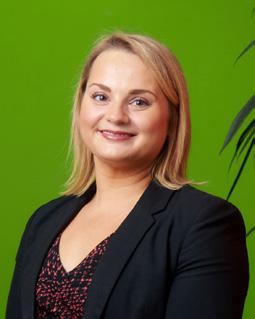


Social purpose law firm, Anthony Collins, has announced eight associate and senior associate promotions spanning several sector-facing teams, as part of an ongoing focus on investing in its employees.
In the property team, Cara McNeely has been promoted to senior associate. She specialises in property and land acquisitions for registered providers and charities, with a particular focus on social housing.
In the private client team, both Lucy Bluck and Charlotte Raybould have been promoted to senior associate. Lucy is a family lawyer specialising in areas such as wills, probate, power of attorney and estates. Charlotte advises families in cases where there is a dispute over living and or contact arrangements for children.
The fourth senior associate promotion is Lorna Kenyon-




Pain in the corporate litigation team, who works with clients in the health and social care and social housing sectors, advising on regulatory and criminal investigations, health and safety matters and inquests.
The firm has also promoted four solicitors to associatesMohamed Karim in the property team, and Matt Marsh, Rumandeep Dhariwal and Tom Corrigan in the projects team.
Matthew Wort, senior partner at Anthony Collins, said: “It is a privilege to work at a firm so dedicated to championing its people and these eight promotions are all very well deserved. As a B Corp accredited firm, we want to see all of our people achieve more with us than they ever thought possible. Making a substantial investment into developing our people is a key part of our ongoing strategy.”

National law firm for life and business Shakespeare Martineau has announced nine promotions across a variety of teams and locations, including six in Birmingham.
Effective 1 May 2024, Simon Hayden has been promoted to partner. Simon has more than 20 years’ experience in acting for a range of property developers, landowners and occupiers but with a particular interest in development work. He has dealt with conditional and unconditional disposals and acquisitions of varying sizes and complexities, along with options, overage agreements and easements.
New legal directors include Specialist construction
solicitor Laura Taylor, who advises on both contentious and non-contentious matters and works with a vast range of public and private sector clients.
Monica Ghai, who practises in all areas of family law breakdown, including divorce and financial remedy proceedings, as well as disputes involving children and domestic abuse.
Commercial and technology solicitor Stewart Argo, who advises public and private sector clients on a wide variety of issues, including commercial contracts, IT, data protection and transactional intellectual property.
Employment lawyer Danielle Humphries and Mohamed Patel in the real estate finance team have been promoted to associate.
Victoria Tester, managing director at Shakespeare Martineau, said: “It is our people who make our business and it is our clients who benefit from our investments in them, so rewarding high performance is part of our culture. We are committed to the continued investment and development of our people in the West Midlands, empowering them to provide excellent service to clients regionally and nationally.”
Shakespeare Martineau is recruiting lateral hires and teams in the West Midlands.

Data security is now a fundamental consideration for modern business and has been widely recognised as a key ESG governance issue for some time.
Depending on the ESG standard or framework you look at, it may be determined a ‘material’ or key risk to your company according to the nature of operations you conduct or industry you sit within. It can be argued that data security may have greater financial implications for certain sectors, such as technology and communications or aerospace and defence. However, all businesses and organisations now rely on ITC systems for day-to-day functions, as well as for the processing and storage of sensitive financial or personal information either in relation to their employees, their customers or their own intellectual property.
For example, the impacts of a recent cyber-attack involving CTS, an IT partner for the legal sector, are wide ranging and have had huge implications for as many as 80 conveyancing firms whose case management systems were taken offline.
The BBC highlighted both the emotional and financial impact this was having on property buyers and conveyancers as both were left in limbo following the incident.
In today’s digital world, the impacts of cyber-attacks or data breaches have been shown to significantly impact companies in a number of ways; they not only prevent the business from operating in terms of reduced performance or productivity, in turn, impacting customers, but also through financial penalties, as well as the harder to calculate outcome of reputational damage.
Forbes recently published an article referencing the likely data/cybersecurity issues and challenges in the year ahead for companies, organisations and governments. This included an anticipated increase in disruptive ‘hacktivism’ surrounding major global events such as the Paris Olympics and various global elections. The continuation of global conflicts is another consideration; as geopolitical tensions continue to rise, key ICT systems are increasingly vulnerable to cyber-attacks.
Another area of concern is also expected to be targeted risks on
digital infrastructure of individual companies from cyber-criminals using ransomware.
How can companies mitigate such risks when so many are reliant on and interact with third-party systems and software? Effective data and systems security management practices and strategic risk management can all help to reduce risk, which comes back to good governance.
Cyber-security should be high on the agenda at board level in organisations and for those responsible for risk management, which should include regular reviews of systems and industry best practice, as well as a requirement for ongoing employee training. However, no strategy or approach can reduce risk entirely, and cybersecurity experts are suggesting more tailored approaches are necessary to mitigate specific vulnerabilities and threats as cyber-attacks become more sophisticated and damaging.
Are you ready to help your firm transition to a better future?
Learn more about Landmark’s Sustainability Training Services.
We have always encouraged Birmingham’s legal practices to ensure they are represented on Council to help shape the ongoing work of the Society. From September, there will be vacancies on Council, and we invite you to put forward a representative from your organisation who you know would be interested in actively contributing to the work of the Society.
A form of nomination form can be requested from the team which needs to be returned by Friday 26th July 2024 having been duly proposed and seconded by (fully paid up) members of the Society.
The Deputy Vice PresidentVoluntary Role – 1 year term from September 2024, leading to Vice President in September 2025
Please see the terms below as there will be changes to the presidential year in 2026.
DVP term Sept 2024 to Sept 2025 VP term Sept 2025 to June 2026 President June 2026 to June 2027
A previous Society rule change means that It is no longer a requirement that the person needs to be a member of Council
JOINT HONORARY SECRETARY POSITIONS – two voluntary positions available from September 2024
The role of the Honorary Secretaries is to:
1. Be responsible for ensuring support for the President and Council.
2. Undertake and assist the office of the Society in making arrangements for the Society’s
or the Society’s Board. Open to all full members of the society
a. Any solicitor who holds a current practising certificate;
b. Any solicitor on the Roll who has retired from practice;
c. Any barrister;
d. Any Fellow of CILEX;
e. Any registered foreign or European lawyer who is regulated by an Approved Regulator;
f. Any lawyer holding a legal appointment or teaching law;
g. Any other lawyer approved by Council;
h. Any person who is in a senior position of an organisation providing legal services who is approved by Council.
The Deputy Vice-President’s role is to:
Assist the President and VicePresident in all their functions and to deputise for them when necessary; and undertake such other responsibilities or duties as may be delegated by Council or the President.
The Deputy Vice-President’s key
Annual General Meeting, and Extraordinary General Meetings and Council meetings.
3. Assist the President, VicePresident and Deputy VicePresident at the meetings of the Officers and Council.
Please find further information in the link: https:// birminghamlawsociety.co.uk/ birmingham-law-society-officerand-council-positions/
tasks are to:
1. Build effective working relationships with Council members and the Board;
2. Meet with sponsors and forge links with potential sponsors;
3. Attend Council meetings;
4. Attend monthly Officers’ meetings;
5. Attend Board meetings as an ex-officio member of the Board during their term in office;
6. Attend at least one of the Professional Committee’s meetings during their term;
7. Develop relationships with the Society’s membership;
8. Be the conduit between the Professional Committees and Council.
Closing date: Close of business on Friday 26th July 2024
If interested in the position, email becky@birminghamlawsociety.co.uk
If you have any queries please contact the office by email becky@birminghamlawsociety. co.uk or by phone: 0121 227 8700.
Closing date: Close of business on Friday 26th July 2024
If interested in the position, email becky@birminghamlawsociety.co.uk
If you have any queries please contact the office by email becky@birminghamlawsociety. co.uk or by phone: 0121 227 8700.



With the Legal Ombudsman (“LeO”) recently publishing its business plan and budget for 2024/2025, it is time to review the latest developments both in the performance of the LeO and that of the profession. As to the latter, the LeO revealed that 45% of complaints that the LeO investigated last year entailed inadequate complaints handling by the firm involved writes Jayne Willetts Solicitor Advocate of Jayne Willetts & Co Solicitors Ltd.
These figures have not escaped the notice of the Legal Services Board (“LSB”) which has published new requirements for regulators amid concerns that legal services providers are
not doing enough to prevent complaints escalating
On 1 April 2023, the LeO introduced changes to the Scheme rules, all of which (it was hoped) were designed to increase the LeO’s powers to reject complaints at the early resolution stage. The principal change was the reduction in the time limit for referring a case to the LeO - reduced from six years to one year from the date of the act or omission being complained about. Also, the time limit from the date that the complainant should have realised that there was cause for complaint was reduced from three years to one year. The Ombudsman retained discretion (Rule 4.7) to extend the 1-year
time limit if it were fair and reasonable to do so.
As it is now 12 months since the changes were introduced, the LeO is less likely to exercise its discretion to extend the time limit. The new time limits will have bedded down and complainants are less likely to be caught by surprise.
Firms should have amended their documentation to reflect the new time limits. If they have failed to do so, the LeO is more likely to exercise its discretion to extend the time limit in favour of the complainant.
The other changes introduced last year included dismissing complaints if the loss or detriment to the complainant was not significant; if the case was too

large and/or complex and to exclude from investigation new already known issues being added to an existing complaint.
Whilst it is early days to assess the effect of these changes, it is hoped that the improvement in the informal early resolutions reported by the LeO are as a consequence of these important rule changes.
It is relevant here to explain that the only means by which a complainant or a law firm can challenge the decision of the LeO is by way of judicial review. There was an extreme example recently of a former client complaining about an historic transaction.
In Alexander v Legal
Ombudsman & Stevenson Glassey Solicitors [2024] EWHC 886 (Admin), Ms Alexander sought permission from the Administrative Court to judicially review a decision made by the Legal Ombudsman in 2022 to reject a complaint relating to a 2004 house purchase - some 18 years after the transaction was completed.
She asserted that she had paid an additional payment to the law firm of £500 which would be returned once the vendor obtained documentation from the local authority. The Legal Ombudsman had thoroughly investigated the complaint and found no evidence to support the complaint. The Judge certified that the claim was totally without merit. What is interesting here is that the LeO exercised its discretion and did not reject the complaint ab initio as being way outside the six-year time limit as it was then. One would hope that the LeO would now rely upon the new time limits and reject such a complaint out of hand.
Despite the LeO being threatened with judicial review on a fairly regular basis, only a handful of cases have reached a full hearing since the LeO was set up in 2010. Six of these were decided on a fact-sensitive basis (four in favour of the LeO and two against) without developing any new body of law or changes in public law principles. The one clear point that has emerged is the consistent acceptance that the LeO has a wide discretion within a statutory framework which is itself drawn in very broad terms. In other words, the test is “what is fair and reasonable in all the circumstances of the case”.
A minor change during the last 12 months is that the LeO has changed its postal address from PO Box 6806, Wolverhampton, WV1 9WJ to PO Box 6167, Slough, SL1 OEH. The telephone
number and website remain the same - 0300 555 0333 and www. legalombudsman.org.uk.
Firms will need to change their retainer documentation, internal Complaints Procedure Policies whether printed or electronic or on websites and finally amend the Complaints Information section printed on invoices to reflect the new address.
There has been some improvement in LeO performance reported in the 2024/2025 LeO plan, but complaints to the LeO that require investigation still have to wait for nearly three months before work begins and up to nine months for a conclusion. It is this queue of cases awaiting allocation to an investigator that causes the problem. In 2022, the queue was 5.862 cases and in 2023 it reduced to 4,282 cases. Optimistically the LeO is hoping to bring this figure down to 3000 in 2024 and 1650 in 2025.
Firms need to ensure that they collate all documentation and records relating to a complaint so they can be on top of their brief as soon as the case is allocated and the LeO investigator begins work. Asking for further time to retrieve files from archives or copy emails is not a recipe for a speedy resolution of a complaint. The use of informal early resolution techniques has also helped, aided (one anticipates) by the rule changes referred to above. At the end of December 2023, 45% of all cases had been resolved within 90 days.
The use of what is colloquially referred to as “reasonable offer made” at Rule 5.7 (c) is an important tool in the early resolution stakes. The LeO can dismiss a complaint where the law firm has already offered fair and reasonable redress to the complainant which has already been accepted or is still open for acceptance.

To achieve these improvements the budget is up 7% for this year to £18m paid for by a levy paid for by all authorised lawyers.
The profession’s performance & the LSB requirements
As mentioned in the introduction above, 45% of complaints to the LeO last year involved inadequate complaints handling by the firm involved. The LSB has said that there needs to be a “step-change improvement” in first-tier complaints handling and that it wants legal service regulators such as the SRA to compel law firms to improve their complaints handling – with enforcement measures taken if necessary.
The SRA will be assessed by the LSB on how it improves the firsttier complaints handling of the firms it regulates and it has 18 months to comply with these new requirements. The profession should therefore expect a focus by the SRA on the data for each firm’s complaints handling performance and then thematic review visits to those firms who have a large number of LeO complaints.
The LSB requirements are very detailed, and some might say oppressive. The LSB recognises that some complaints may be vexatious and/or frivolous but nonetheless it insists that the SRA introduces measures to avoid complaints being dismissed as vexatious and frivolous even when they are not – so the profession will not be trusted to determine whether a complaint is vexatious or frivolous.
The LSB is keen on communicating the complaints procedures to clients and suggests short video clips or animations i.e. cartoons and use of a range of media. Complaints policies are expected to be prominent on websites and “not require multiple clicks to access”. Investment in IT will be required.
In a superb example of quango logic, the LSB has stated that if a firm did not have any or a very low number of complaints in practice areas that are commonly subject to complaints this might indicate that there is a flaw in their complaints processes. Many more positive thinkers would conclude that the reason why a firm had very few complaints was because the
practice delivered exceptional service not because they were hopeless at complaints handling.
Space does not permit a more detailed review of all the LSB requirements (see LSB website) but complaints handling partners would do well to review them and test their own current procedures against the LSB expectations. These obligations will no doubt be reproduced in SRA Guidance on first-tier complaints handling within the next 12 to 18 months so forewarned is forearmed.
The SRA will need to do its homework and deliver on the challenge set by the LSB. Because of the LSB scrutiny, the SRA is unlikely to be interested in any excuses for poor complaints handling. Investigating whether firms are dealing with complaints satisfactorily is a relatively simple job compared to other investigations such as the Post Office lawyers. We are in the realm of “low hanging fruit” – a bit like AML failures – easier to investigate and quicker to fine. Empathy for the profession will be in short supply.
On the plus side, at least improving the first-tier complaints handling of the profession can be regarded as a core function of the SRA as opposed to some of the more fanciful and politically motivated directions that have been taken by the SRA in recent years. Good complaints handling is an essential part of the delivery of legal services. Whilst one knows that some complaints are impossible to resolve, the more complaints that the LeO has to handle the higher the levy on the profession. It is that simple.
To reinforce the point, the LeO forecasts that a further increase of 5% in demand would require a full additional team at a cost of about £600,000. Suffice to say, improvement is needed not only by the LeO but also by the profession.

I have worked in private practice and as an in-house lawyer for many years now and a recent expression got me thinking. It states, “My ducks are absolutely not in a row. I don’t even know where all of them are, and I am pretty sure one of them is a pigeon”.
I know this expression resonates with many in-house lawyers writes Allia Khan, Committee Member at Birmingham Law Society In-House Committee
Remember, it’s okay not to have everything perfectly in place all the time. Sometimes, life throws us unexpected challenges, and that’s when we need to take a step back, reassess, and tackle one thing at a time. If one of your “ducks” seems out of place, take a moment to identify what it is and make a plan to address it. And, as for the pigeon, perhaps it’s time to figure out where it belongs or if it’s time to let it fly away.
But, on a more serious note, let’s look a little further into why those ducks don’t always need to be in a row and how striving for perfection can sometimes have a negative impact on you. Why not accept that every individual in house lawyer is different and sometimes a few pigeons, turkeys or any other type of bird is a good thing. Embrace diversity!
We are told time and time again that In-house lawyers, like professionals in any field, should be mindful of their mental health and well-being. We know that the legal profession can be demanding and stressful, with long hours, high-pressure situations, and challenging cases. If you are not already taking active steps in this area then let’s do something about it and make conscious efforts to bring about change.
Here are some key considerations for in-house lawyers regarding mental health:
1. Recognise the Signs of Stress and Burnout: Being aware of the signs of stress and burnout is crucial. These may include feelings of exhaustion, cynicism or detachment from work, and a sense of ineffectiveness or lack of accomplishment. Recognising these signs early can help prevent more serious mental health issues.
2. Prioritise Work-Life Balance: Strive to maintain a healthy balance between work and personal life. This can include setting boundaries around working hours, taking regular breaks, and making time for activities that promote relaxation and wellbeing.
3. Seek Support: Don’t hesitate to seek support from colleagues, supervisors, or mental health professionals if you’re feeling overwhelmed. Many organisations offer employee assistance programs (EAPs) that provide confidential counselling and support services.
4. Practice Self-Care: Engage in self-care activities that promote physical and mental well-being, such as exercise, mindfulness meditation, hobbies, and spending time with loved ones. Taking care of yourself is essential for maintaining resilience in the face of stress.
5. Develop Coping Strategies: Identify healthy coping strategies that work for you, such as deep breathing exercises, journaling, or talking to a trusted friend or mentor. Having a toolbox of coping mechanisms can help you manage stress more effectively.
6. Set Realistic Expectations: Be realistic about what you can accomplish within a given timeframe and communicate openly with colleagues and supervisors about workload and deadlines. Setting realistic expectations can help
reduce feelings of overwhelm and prevent burnout.
7. Promote a Positive Work Culture: Advocate for a positive work culture within your organisation that prioritises employee well-being. This can include initiatives such as flexible work arrangements, mental health awareness training, and fostering a supportive and inclusive environment.
8. Take Regular Breaks: Even during busy periods, make it a priority to take regular breaks throughout the day. Stepping away from your desk, going for a walk, or practicing mindfulness can help clear your mind and improve focus and productivity.
9. Know When to Seek Help: If you’re experiencing persistent feelings of anxiety, depression, or other mental health issues, don’t hesitate to seek professional help. Talking to a therapist or counsellor can provide valuable support and guidance.
10. Lead by Example: As a leader within your organisation, lead by example by prioritising your own mental health and encouraging open dialogue about mental health issues among colleagues. By destigmatising mental health discussions, you can help create a more supportive and resilient workplace culture.
Remember that there is no need to seek perfection when you are already perfect!
Taking care of your mental health is just as important as taking care of your physical health. By prioritising self-care and seeking support when needed, we can strive to manage the demands of our profession and maintain overall well-being.
For further support, visit www.mind.org.uk
www.lawcare.org.uk

Jayva was ‘born’ ten years ago, in 2014, out of our founder Nicola Moore-Miller’s passion for helping law firms with their technology adoption in order to achieve amazing outcomes. As we celebrate the impressive milestone of our tenth anniversary, we review the past decade of technology innovation.
Digitisation of the office
Law firms have moved from an old school set up composed of paper files, manual processes and physical office to a digital workplace made up of electronic records, technology-automated procedures and remoteor-hybrid environment. As such, the contemporary lawyer is untethered from his or her desk.
This shift was already happening, however, the sudden arrival of covid caused rapid acceleration. It was a case of ‘go digital or go bust’ when lockdowns grounded us in our homes overnight. The technology powering the current-day office includes…
Case, document and practice management –Maintaining the electronic records alluded to earlier, this is the central platform for your matter, client and accounts information, whether it’s correspondence templates, document depository, financial data, whatever. This software is
designed to produce, store and manage information with ease.
Workflow management
– One of this type of software’s biggest selling points is case workflow with automation. This means guidance through the stages of a standard matter by automating structured processes with workflow rules. The amount of human input is minimised so, in turn, your fee earning potential is maximised.
Smartphone app – If every legal professional didn’t already have a mobile phone ten years ago, they certainly do now. The trend initially began way back when with widespread adoption of BlackBerry devices in the business world; latterly, Android and iOS platforms. With the proliferation of smartphones come apps for case management on the go – at home, in police stations, in court and in the community. Traditional barriers exist no more as lawyers become location agnostic.
Cloud computing – Also known as software-as-aservice (SAAS), this concept applies to the migration from on-premise systems hosted by the data centre model to remotely accessed systems hosted in the cloud. Solicitors only need an internet connection to log into their core systems anywhere, anytime, any device, further assisting remoteand-hybrid working.
5G connectivity – Having referenced the web’s vital role in driving the modern lawyer’s technology, the fifth generation or 5G telecommunications standard provides connectivity to most mobile phones. 5G comes with higher bandwidth and faster download speeds for significant time-saving advantages on everyday tasks.
Full fibre broadband – In a similar vein, broadband technology has advanced rapidly, now promising superfast speeds, less buffering, fewer dropouts and reduced slowdown, even at busier times. From a professional perspective, full fibre broadband permits a productivity boost.
Artificial intelligence – AI has emerged onto the legal scene in numerous guides, from chatbots mimicking human conversation through text or voice interactions, to generative AI applications for content creation in every format, to e-discovery software sourcing case- or claimspecific evidence. Ultimately, AI is anything simulating human intelligence by machines performing tasks typically done by people for major efficiency benefits.
Data-driven decision making – Appreciating the value of data and its insights with regards to making strategic decisions across all aspects of practice, ‘business intelligence’ has become another buzzword in our industry. Law firms own a wealth of data but converting this data into insights is a challenge. It’s made possible by business intelligence systems and their promises to create captivating visual stories that propel practices forward.
Standalone becomes integrated – With so many specialised programs in the marketplace, each performing an essential function for commonplace duties, the ability to connect these disparate tools is paramount. Application programming interfaces, known widely by their acronym API, link tools together using requests and responses, so everything works as one in pursuit of the same
goal – this being to tackle incompatibilities, abolish silo operations and digitise processes optimally.
Courtroom video conferencing – Virtual hearings in digital courts is another initiative transforming the UK’s justice system by swapping bricks-and-mortar venues and printed paperwork necessitating in-person attendance for online conferencing technology and electronic documentation with participants joining by video and/or telephone links. Court backlogs are being cleared and the course of justice is being expedited with revolutionary efficiencies for all parties concerned in these virtual proceedings.
Final words
Having taken our readers on a whistlestop tour of all-things legal technology over the past decade, we’ve only touched upon its expansive and diverse perks and rewards. While it’s a huge oversimplification, these technological advancements and developments are truly of life-changing and metamorphic proportions.
At Jayva, our mission is to inspire law firms to harness the power of technology to succeed in an increasingly competitive landscape. Our extensive portfolio of software consultancy and training services are the ideal solution to any technology conundrum.
Read more on our website at www.jayvaglobal.com/ toolkit/technology. Get in touch with our friendly team to discuss your upcoming projects by emailing info@jayvaglobal. com or visiting www.jayvaglobal.com/ contact-us.



Harness the power of your technology
Realise ROI from your software investment
Thrive in today’s challenging legal space
Benefit in many more, expansive ways
“The training of super users was a genius stroke. It spreads the technical know how around and prevents one sole person being inundated with system queries.”
Andrew Horwich, Symes Bains Broomer Solicitors
“Our Jayva trainers showed us around the software features relevant to our diverse roles in practice. The staff are friendly and efficient which is a formidable combination.”
Andrew Gray, Truth Legal



For many, the path to becoming a solicitor involves working as a Paralegal. Paralegals play a vital role in law firms, providing essential support to solicitors and barristers. Their responsibilities may include legal research, drafting documents, client communication, and assisting with case preparation. This hands-on experience allows aspiring solicitors to develop a deep understanding of legal procedures, case law, and client management writes Amanda Hamilton, Patron of the National Association of Licensed Paralegals (NALP)
Working as a paralegal offers invaluable opportunities to hone practical skills essential for a career in law. Paralegals often work closely
with solicitors on a wide range of cases, gaining exposure to various areas of law such as family law, criminal law, corporate law, and litigation. This not only enhances legal knowledge but also cultivates skills in critical thinking, problemsolving, and attention to detail.
As part of a legal team, paralegals have the chance to network with experienced professionals; building strong relationships with solicitors, barristers, and other legal professionals can open doors to career advancement.
And working as a paralegal can count towards your two years’ qualifying work experience should you wish to go on to do your SQE.
How you make the move from paralegal to solicitor depends very much on whether or not you have a qualifying law degree or a degree in another discipline (or equivalent, such as an Ofqual Level 6 qualification).
If you do have a qualifying law degree, then there are currently two routes to qualifying as a solicitor.
One: Apply to complete the Legal Practice Course (LPC) which can cost between £12,000 - £17,000 depending on which training provider is offering it.
Two: Go through the Solicitors’ Qualifying Examination (SQE) which is far less costly. The SQE1 and SQE2 exams cost a total of just under £4,000 but the preparation for these two courses can cost up to £6,000, so approximately £10,000 in total (subject to any possible discounts being offered) It is hoped that the LPC will be replaced eventually by the SQE.
If you have a degree in another discipline, then the routes to qualifying are currently twofold also. Firstly, you could apply to do a Post Graduate Diploma in Law (PGDL) which is a law conversion course and takes one year to complete. This costs between £7,000 - £13,000 and once completed you go on to do the
LPC as above. The alternative is to go straight into the SQE1 and SQE2. Clearly the latter route is far less costly than completing the PGDL and LPC which in total can cost up to £30,000.
The next step is to complete two years’ qualifying experience which can include any time you have had working as a paralegal. The final step is to pass the SRA’s character and suitability test before being admitted on the role of solicitors.
If it is your intention to qualify as a solicitor, then working as a paralegal and gaining qualifying experience is just as essential as completing the SQE itself as it opens up options.
Starting your legal career as a paralegal is a great way to gain experience while earning a living. During this time, if you decide that becoming a solicitor is not for you, but you’d still like to work within the law, then choosing a career as a paralegal is a great option.
With the virtual eradication of legal aid some ten years’ ago, there is an increasing requirement for consumers to gain access to justice at a reasonable cost. Paralegals can fill that gap simply because many solicitors will not wish to take on work at the ‘bottom’ end of the scale. Examples would be an individual who requires assistance to collect a ‘small claim’ debt or needs help to complete forms after someone has died, or even needs advice on how to take an individual to court for breaching a contract.
Without professional paralegals stepping in, the huge cost of solicitor fees would see many consumers having to resort to free advice and assistance offered by solicitors/barristers offering ‘probono’ work or organisations such as Citizens’ Advice and others. A Paralegal Practitioner can offer assistance at approximately one tenth of the fees that a solicitor may charge for the same job. We
are talking about the difference between paying £200-£500 per hour (depending on seniority, location in the UK, and nature of the case) which is definitely outside the scope of most consumers, compared with £20-£80 per hour which is what a paralegal may charge.
Additionally, there are plenty of opportunities in other sectors to use your paralegal skills. Most organisations will have an element of legality to what they do and will always have a need for someone with paralegal skills to assist them. For example, a few years’ ago Jimmy Choo Shoes advertised for a NALP qualified paralegal to work in their legal department. The possibilities of gaining a glam job are endless: working with a premiership football club, working with one of the big oil companies, working in retail or car manufacturing companies.
Reserved activities and holding out Reserved activities are those that are specified in The Legal Services Act 2007 which can only be practised by authorised individuals such as solicitors or barristers. Paralegals cannot undertake these activities.
Conducting litigation is something that only solicitors can do. This means effectively that paralegals cannot act as agents for their clients; paralegals must not issue proceedings, receive or sign documents on behalf of clients, but they can assist clients to complete forms as long as all documents are signed and served by the clients themselves.
Paralegal do not have the automatic right to represent a client and address the court on a client’s behalf. Nor can they call or examine witnesses. However, there is nothing preventing a paralegal requesting the judge to grant the right, but this will only be given at the discretion of the judge, which may depend on the circumstances of the case. If not granted, then the paralegal can assist the client to do this themselves.
There are four other reserved activities: conveyancing, probate and notarial activities, and administration of oaths. Any paralegal practitioner should know and understand what these are and how they may possibly restrict their business.
It is important that paralegals avoid ‘holding out’ – they must never suggest that they are anything other than a paralegal practitioner. Even referring to themselves using the term ‘lawyer’ can be misunderstood by a consumer to mean ‘solicitor’ even though it may not be technically wrong to refer to themselves as such.
Summary
Working as a paralegal provides a firsthand look into the inner workings of the legal profession— from observing courtroom proceedings to participating in client meetings, paralegals gain valuable insights into the day-to-day realities of the legal sector—and serves as a valuable stepping stone on the pathway to becoming a solicitor. If this is a path you wish to pursue there are SQE Prep courses that can be taken with an organisation such as BARBRI to help you prepare for both the SQE 1 & 2.
Alternatively, three years of paralegal work will count towards the relevant legal experience required to apply for a NALP Licence to Practise and you can set up on your own as a Professional Paralegal Practitioner (subject to evidence of competency in the areas in which you wish to practise and to gaining professional indemnity insurance). Or you can work in a variety of sectors as a paralegal, from local government to fashion, from football to property, from charities to defence.
www.nationalparalegals.co.uk

The legal profession in the UK has seen a significant transformation with the introduction of solicitor apprenticeships. These programs, approved by the Solicitors Regulation Authority (SRA), provide a comprehensive route for aspiring legal professionals to enter the field.
For more information on what the SRA has said about these apprenticeships, you can visit www.sra.org.uk/apprenticeships
DATALAW’S SOLICITOR APPRENTICESHIP PROGRAMS
Datalaw offers two distinct types of solicitor apprenticeships – the Level 7 Solicitor Apprenticeship and the Graduate Solicitor Apprenticeship – both of which are approved by the SRA and tailored to meet the needs of different candidates.
Datalaw’s Solicitor Apprenticeship: This program is designed for individuals seeking an alternative route to becoming
a qualified solicitor. It integrates on-the-job training with academic learning, providing a well-rounded approach to legal education.
The apprenticeship covers various aspects of legal practice, equipping learners with the skills and knowledge required in the legal profession. For more details on this program, visit Datalaw’s Solicitor Apprenticeship page.
Datalaw’s Graduate Solicitor Apprenticeship: Tailored for law graduates, this apprenticeship offers a pathway to a solicitor qualification for those who have completed their university education. The program focuses on providing practical legal training alongside preparation for the Solicitors Qualifying Examination (SQE). It’s an excellent opportunity for graduates to gain hands-on experience while progressing towards becoming a qualified solicitor. For further information, visit Datalaw’s Graduate Solicitor Apprenticeship page.
Enrolling employees in a solicitor apprenticeship with a training provider is really beneficial for employers. It allows them to improve the skills of their current staff in a way that’s specific to their firm’s needs. The highquality training from professional providers means employees learn important, up-to-date legal knowledge while still working at the firm. This investment in staff development not only makes employees feel valued and more likely to stay, but also saves the firm money and time on hiring new people. Additionally, employees can use what they learn right away in their jobs, which helps the firm do better work for their clients. Overall, these apprenticeships are a smart way for employers to strengthen their team and help their firm succeed in the long run.
Through Datalaw’s law apprenticeships trainee solicitors can be funded via the Education Skills Funding Agency (ESFA) which will help support learners and firms. To learn more about the funding available, such as government contributions and how they can be leveraged by law firms, please book a 1-2-1 call with Datalaw’s Apprenticeship Coordinator.
In conclusion, SRA-approved solicitor apprenticeships like those offered by Datalaw provide a viable and dynamic pathway into the legal profession. They cater to a diverse range of needs, from school leavers to law graduates, ensuring that everyone has an opportunity to pursue a career in law through a structured and supported route.
www.datalawonline.co.uk

29th April 1994. Prince ruled the UK charts with The Most Beautiful Girl in the World. Ray Liotta was captivating movie theatres with No Escape. And Sir Norman Fowler was opening our Birmingham office doors for the very first time, marking the start of an exciting connection between Quilter Cheviot and the city writes Ben Mountain, Head of Birmingham Office at Quilter Cheviot.
Fast forward three decades and Quilter Cheviot’s Birmingham office has evolved from a modest setup at 39 Bennett’s Hill to a thriving hub at Two Snowhill, now home to over 40 dedicated Quilter Cheviot team members.
Over those 30 years, the Birmingham office has had a front-row seat to the city’s transformation. The opening of Queen Elizabeth Hospital. The redevelopment of both the Bullring and the city’s library. The 2022 Commonwealth Games. And the ongoing development of the first intercity terminus train station to be built in Britain since the 19th century – Curzon Street Station, to name a few.
Over those three decades, it was essential that we were not mere bystanders; we wanted to (and still do) actively engage in Birmingham’s community. It is why following the closure of Birmingham’s stock exchange in 1986, Quilter Cheviot have been an active member of the Birmingham Stock Exchange
Association, honouring the city’s financial heritage while supporting local charities and exceptional new talent.
It has also always been important that we cultivate Birmingham talent, not just cherry-pick established industry professionals. It’s why we developed an internship programme that offers the first steps on a pathway to a Level 3 qualification from the Chartered Institute for Securities & Investment (CISI), regardless of educational background. This programme provides interns with comprehensive exposure to the business, equipping them with essential skills and connections.
We are equally dedicated to empowering women in the world of finance. Our Women in Investing initiative aims to address common issues and obstacles faced by female investors. Through events including the International Women’s Month webinar series and the Female Financial View podcast, we provide a platform for women to engage in meaningful conversations about their financial journeys.
But our focus doesn’t merely stay within our industry. The Quilter Local Community Fund – which focuses on developing local communities – has raised over £20,000 for important causes in Birmingham including: The University Hospital Birmingham, to help those between the ages of 16-25 battling cancer. And the UK Sepsis Trust, to improve education in schools and provide practical clinical tools to health professionals.
As we reflect on our shared journey, a heartfelt expression of gratitude resonates deeply. In this tribute to the people that embraced us so warmly, we extend a simple yet sincere message to not only the Birmingham Law Society, but the wider West Midlands community: THANK YOU.
You have welcomed us into your home with open arms – so much so that we feel like part of the furniture. Our business is built on helping individuals and families secure their futures for generations. In return for your generous hospitality, we want to share a trio of events in conjunction with our sister company Quilter Cheviot Financial Planning, available to all Birmingham Law Society members, to help you not only secure your wealth, but enhance it:
Tuesday, 9 July – The foundations of financial planning Our specialists shed light on the benefits of early investments, navigate the maze of mortgages, and emphasise the importance of Emergency Funds and ISAs in establishing a solid financial base.
Wednesday, 10 July – Building your financial future We delve into taxefficient strategies, understand the value of the state pension, grow your retirement pot, and analyse the complexities of the buy-to-let scheme.
Thursday, 11 July – Mastering wealth preservation We’ll discuss the implications of Lifetime Allowance abolition, how to efficiently access retirement benefits, and explore how to safeguard your financial legacy.
This event is available to all Birmingham Law Society members, both in person at Irwin Mitchell’s Birmingham office (The Colmore Building, 20 Colmore Circus Queensway, Colmore Row, Birmingham B4 6AH) or via a weblink.
Secure Your Seat by registering for one of the individual sessions here

Imagine having access to a range of products and services in one location, accessible with a single login and invoiced on one bill. This level of integration eliminates the timeconsuming task of navigating through multiple applications, allowing lawyers and staff to focus on what matters most: serving clients. It also simplifies the financial aspects of running a law firm, reducing administrative overheads while helping to improve cost control.
The future of legal practice management lies in bringing together disparate systems onto a single platform, enabling streamlined operations, efficiency gains, and risk reduction. From practice management to conveyancing, due diligence, company formations, accounting, and document management, the future is all about consolidation.
Dye & Durham’s Unity® Global Platform gives law firms everything they need to run a thriving legal practice – in one single place – enabling them to unlock the benefits of a consolidated portfolio of technology tools.
Effective practice management and legal accounting is the backbone of any successful law firm. However, many firms still rely on an array of disconnected systems, causing inefficiencies and delays when systems aren’t communicating with one another. In our view, the future demands a comprehensive practice management solution that consolidates all essential tools and services onto one platform.
In today’s interconnected world, we often operate across borders, serving clients with diverse needs in multiple countries. A consolidated platform
ensures a uniform, one-stop user experience in every market. This global reach with local impact is a significant advantage, particularly for UK firms with international operations.
By providing consistent tools and processes across different regions, law firms can achieve better standardisation and collaboration among their teams, regardless of where they’re located. This not only enhances efficiency but also ensures a higher quality of (consistent) service delivery.
For conveyancers, consolidated technology platforms can make a big difference to their bottom line. For example, accessing legal forms for each case as part of a standardised workflow, which integrates search orders, will ensure that every aspect of the transaction is quickly and reliably delivered, creating valuable time savings and improved accuracy.
There’s also the added benefit of facilitating seamless communication with clients, estate agents, and other parties involved in each transaction, leading to more streamlined or transparent communications, faster completions and happier clients.
In both property and corporate transactions, due diligence is paramount. Law firms (and their clients) need access to reliable information to make informed decisions. Consolidated technology platforms can provide access to comprehensive due diligence reports that cover all aspects of a transaction.
By aggregating data from various sources and automating the report generation process, time savings can be achieved, with
a reduced risk of missing critical information. This not only enhances the due diligence process but also instils confidence in clients, allowing them to make decisions with a clear understanding of potential risks and opportunities.
In the fast-paced world of business, company formations are often timesensitive. A consolidated technology platform can offer fast and reliable company formation services, streamlining the entire process.
With access to pre-filled forms, electronic filing, and real-time tracking, law firms can expedite company formations while minimizing errors. This not only benefits clients by ensuring timely compliance but also allows law firms to expand their service offerings and generate additional revenue.
Trust and firm accounting are critical aspects of law firm operations, but managing them can be challenging, especially when dealing with multiple systems that aren’t inter-operable. Consolidated technology platforms can simplify trust and firm accounting by providing integrated accounting tools, which reduce the risk of compliance violations and errors. Plus, integrated financial reporting allows firms to gain valuable insights into their financial performance, enabling better decision-making and strategic planning.
Document management and storage are essential for maintaining accurate records and ensuring compliance. A consolidated technology platform offers a centralised repository for all documents, making it easier to manage, search, and retrieve critical information.
With advanced search capabilities and version control, law firms can significantly improve document management efficiency. Additionally, enhanced security features ensure that sensitive client information remains protected, reducing the risk of data breaches and potential legal liabilities.
Dye & Durham’s Unity® Global Platform delivers all these benefits and more to law firms looking to make their operations more efficient, free up more fee-earning time, and grow their practices.

